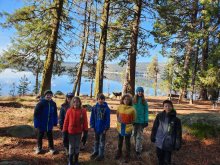
The following article was written by Aaron McKinnon, Primary Years Programme (PYP) Coordinator.
Chaperoning Grade 4 students on their annual 4-day trip to the McCall Outdoor Science School (MOSS) provided the perfect opportunity to reflect on why “Outdoor Education” is one of Riverstone's 5 pillars. The following travel log showcases our outdoor experience and highlights the research on the many benefits of outdoor learning. Link to research summary.
Day 1: Packing the Bus
Amongst the excitement and energy of loading the bus, students were asked about their feelings towards the 4-day, 3-night adventure at the Payette Lake science school. For some, it was excitement, tinged with a little anxiety. For others, it was anxiety, tinged with a little excitement! Either way, students were positive and ready to go, all sharing a can-do attitude. These away-from-school opportunities provide a chance for students to grow and show both their intellectual and behavioral development. During the ride up, all sorts of games were played, including a very impressive, student-initiated round of the “Quiet Game”. Even the road part of the trip provided students a chance to show empathy as individual students were welcomed into conversations and fun; no one was left out. Those who felt sick, both home or road-wise, were comforted by peers and given the support they needed! Many factors contribute to attendance rates, but for this Grade 4 class, they have averaged 97.5% attendance over the last 4 years! Accordingly, one student was sick to start the trip but came up for the 3rd day to be with their friends.
Research shows: School performance increases when children learn outdoors! A number of studies have documented increased school performance through outdoor education. Research has documented increased standardized test scores, enhanced attitude about school, improved in-school behavior, improved attendance, and overall enhanced student achievement when students learn in and about nature. In addition, outdoor education effectively employs a greater range of children’s intelligences. Many researchers contribute the increase in performance to increased relevance and hands-on experience of learning outdoors.
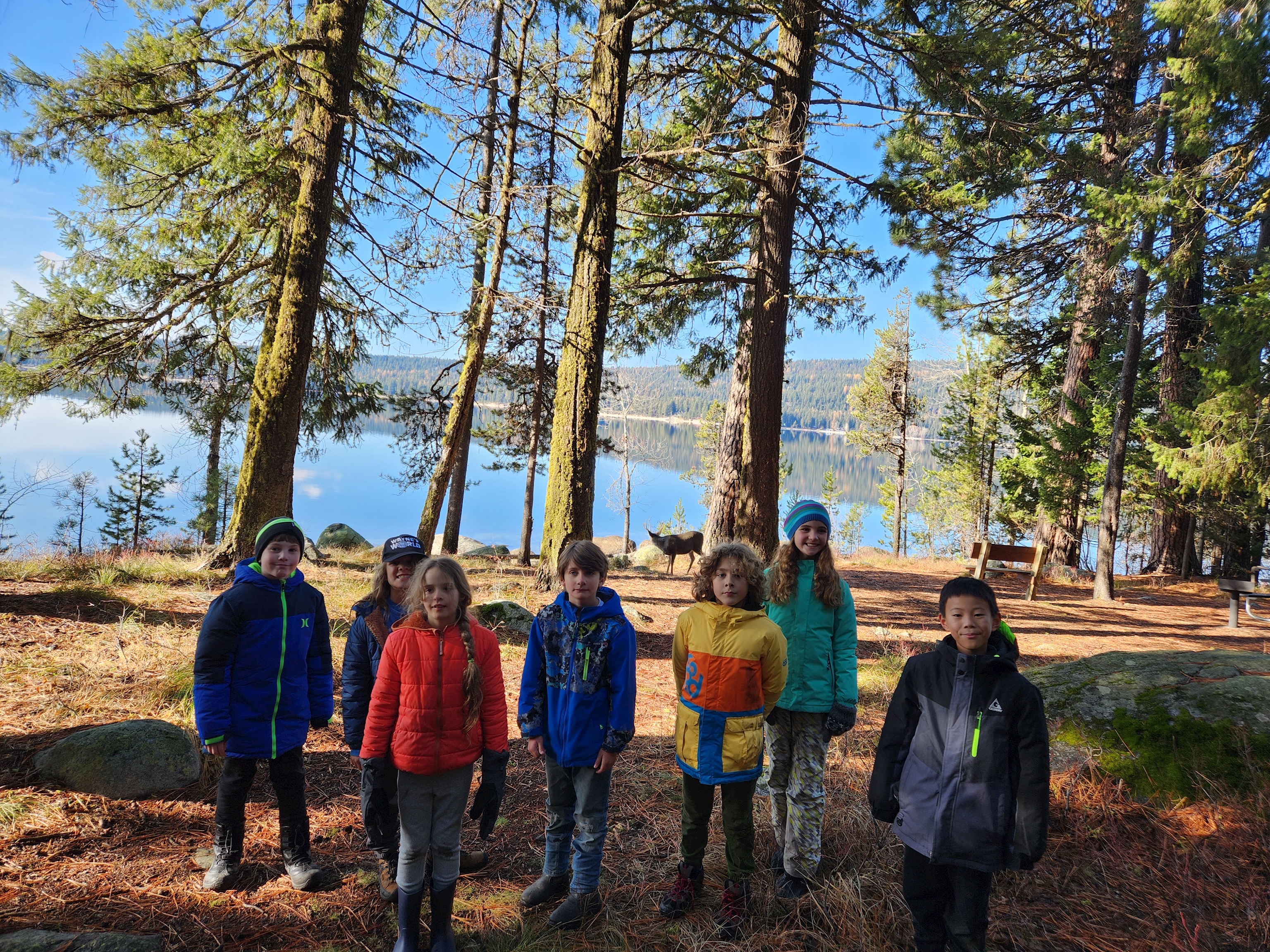
Day 2: Outdoor learning is active and healthy!
After a nutritionally balanced and hearty breakfast, each of the three groups of students were paired with impressive MOSS employees/volunteers, who also happen to be graduate students from the University of Idaho, eager to share their enthusiasm for environmental education and armed with enough behavior management strategies to corral any student. The MOSS campus was the home base to start the day, but we quickly found ourselves hiking through neighboring Ponderosa State Park. With the temperature hovering around 35℉ students needed coats, but warmed up quickly running through trees, exploring squirrel middens, identifying trees, skipping rocks, playing an awesome version of hide-n-seek called “Camouflage,” and quietly waiting for a group of 4 deer to wander through our lunch area. The path we followed was around 2 miles, but the darting back and forth at least doubled that total. The outdoor games during free time and the evening activities also added to the active day. A physically active day for sure, but the research is deep here also, indicating so many health benefits to learning outdoors.
Research shows: Learning outdoors is active and increases students’ physical, mental and social health. Some studies have even shown follow-up (e.g., non-school) physical activity increases with outdoor learning. Access to nature has also been shown to decrease the symptoms of Attention Deficit Hyperactivity Disorder. Outdoor learning and access to nature also decrease stress levels of students and teachers.
Day 3: Fun and Challenges
Each of us faces our own challenges and anxieties, but being in and learning outdoors in a place like MOSS allows students and adults so many chances to face and overcome those challenges and have fun doing so! Mixing it up with new groups of people, unique hands-on learning challenges like protecting our beaver egg from a drop with only nature-found materials, participating in student-created campus-wide games, listening to and learning from new teachers about new topics, learning to calm ourselves at night, trying new food, organizing our supplies, recognizing and controlling our emotions, recognizing personal boundaries and guidelines, dealing with the cold, taking on new responsibilities, problem-solving real problems, presenting in front of strangers, leaving no trace and other unique settings provide moments to grow and move forward.
Research shows: Learning outdoors is fun and supports child development Often, the outdoors provides a change of pace from the classroom, which students and teachers enjoy. Studies have shown increased student enthusiasm for learning outdoors. Children greatly benefit developmentally from being outdoors. Outdoor education and play support emotional, behavioral and intellectual development. Studies have shown that students who learn outdoors develop: a sense of self, independence, confidence, creativity, decision-making and empathy towards others, motor skills, self-discipline and initiative.
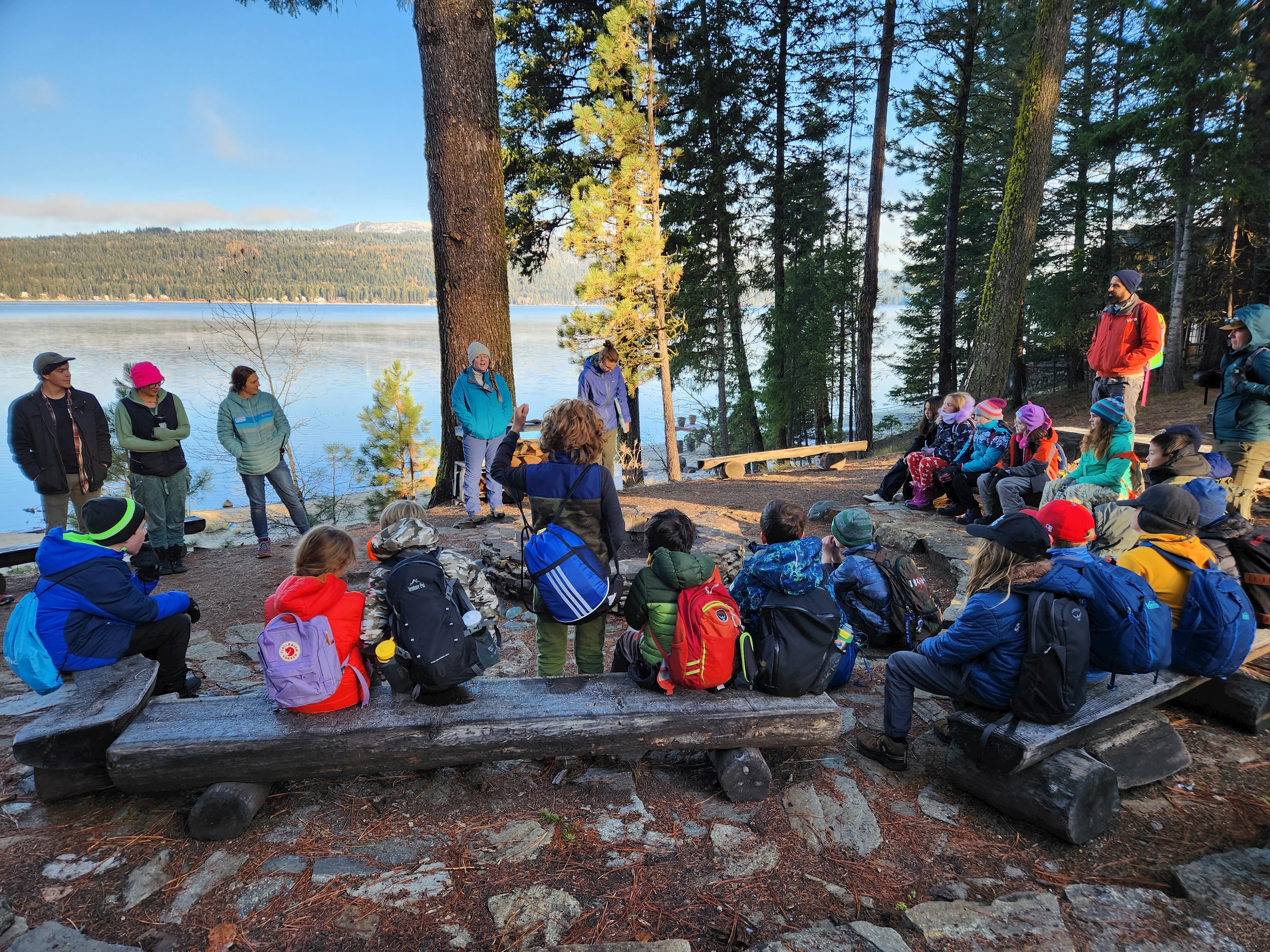
Day 4: Summarizing and heading home
Each student group did their own research, followed their own lines of inquiry, gathered their own data, and created their own presentations. Their data and conclusions were pretty amazing! Next up: keeping the magic, carrying the lessons from the outdoor classroom to the indoor classroom, and sustaining the high levels of performance for the overall success of each classmate and a class with a new classroom teacher. Fortunately, the research shows that outdoor learning is not isolated learning, but builds a foundation of enduring, universal attitudes and behaviors.
Research shows: Learning outdoors helps develop a sense of place and civic attitudes and behaviors. It also engages families and the community. Outdoor experiences help students increase their understanding of their natural and human communities which leads to a sense of place. Through connection to place, students develop stronger environmental attitudes and civic behaviors. Outdoor learning experiences are the foundation of raising the next generation of active citizens who take care of their natural and human communities. Outdoor learning connects families and the community to the school. Outdoor classrooms provide natural entry points for families and community members to get involved with student learning. The relationships developed through outdoor learning lead to greater parental and community involvement in and support for the school.
The Grade 4 visit to MOSS represents one of many trips Riverstone students have the opportunity to participate in, beginning with our 3-year-old Preschoolers and throughout all grades at Riverstone. The exciting memories, deep learning, and relevant research all confirm the importance Outdoor Education plays at Riverstone International School.
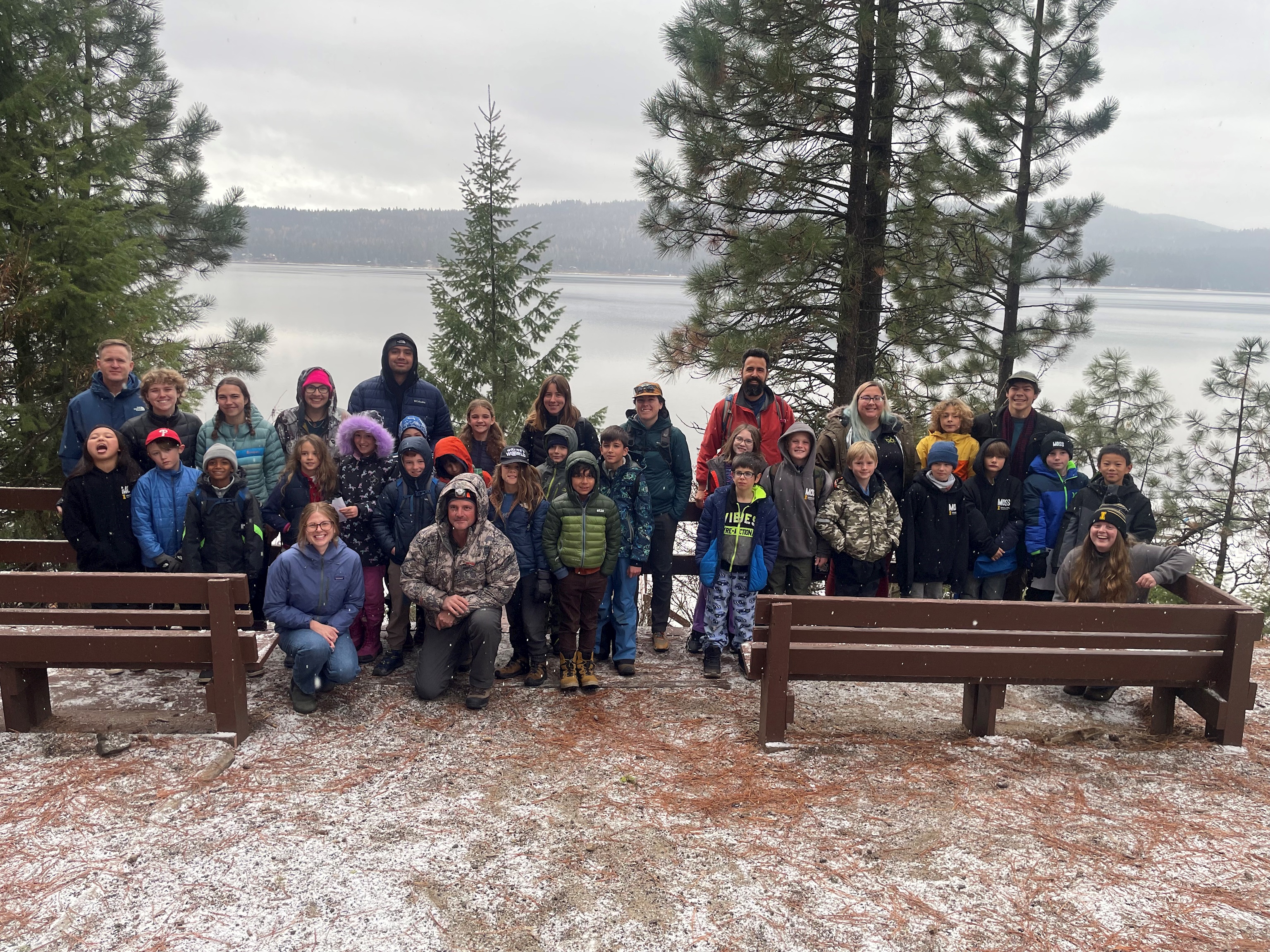

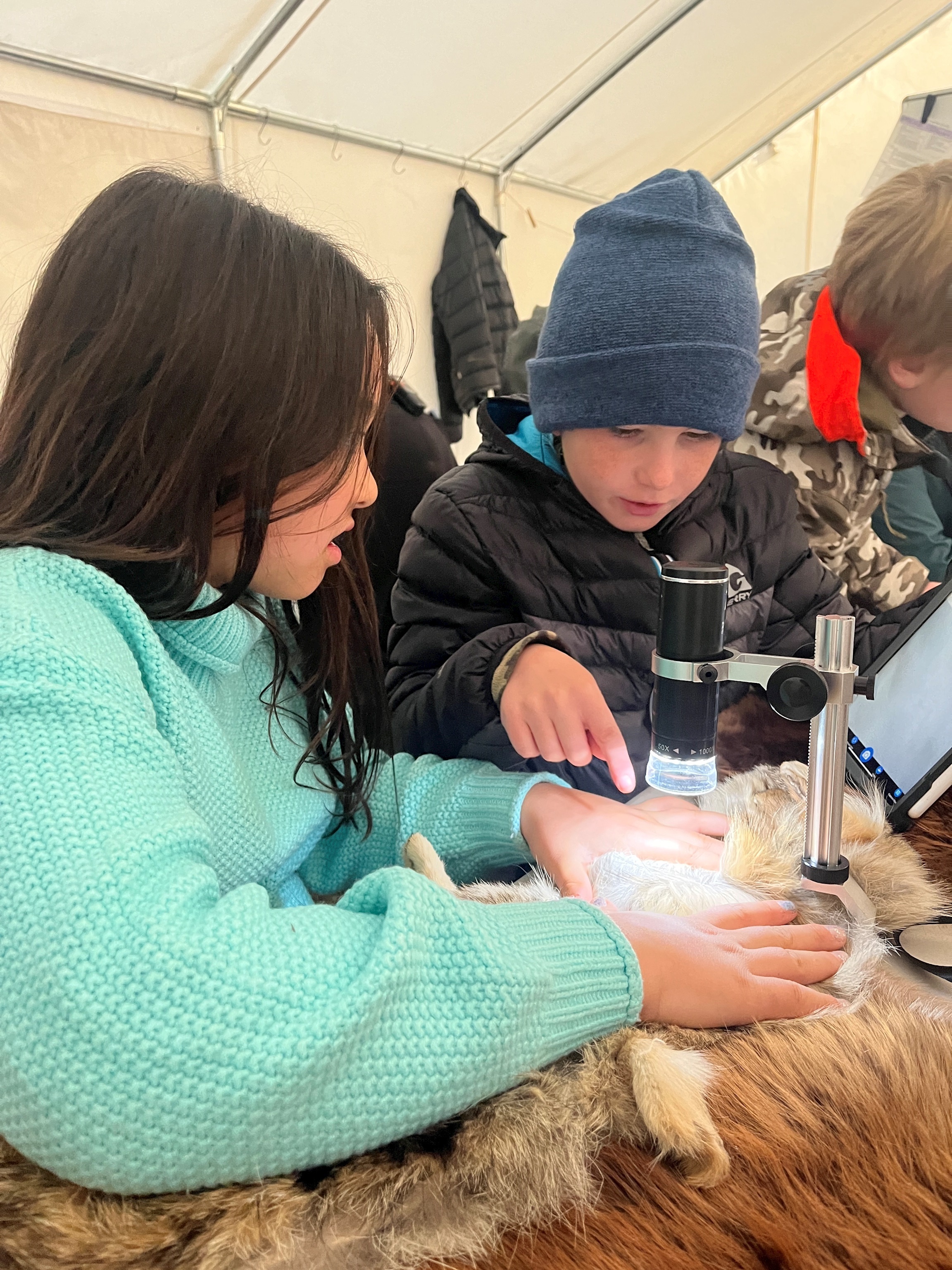

.png&command_2=resize&height_2=85)

















